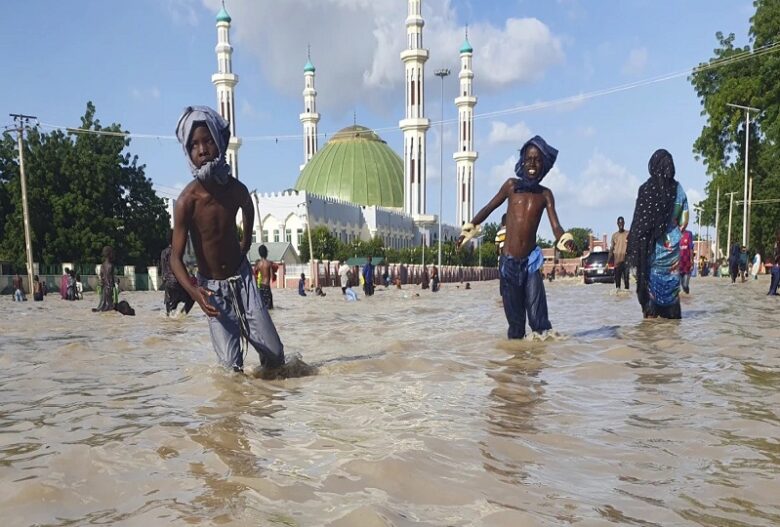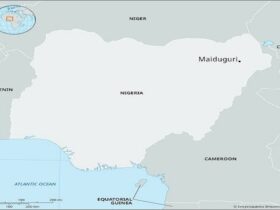Torrential rains across Central and West Africa have triggered the most devastating floods in decades, with Maiduguri, the capital of Nigeria’s Borno state, experiencing severe destruction. Homes were swept away, and inmates from the city’s main prison fled as rising waters from an overflowing dam washed away its walls.
Dead crocodiles and snakes were found among human corpses on what were once the city’s main streets.
The floods, which have claimed over 1,000 lives and displaced hundreds of thousands, have exacerbated the already dire humanitarian situations in Chad, Nigeria, Mali, and Niger.
According to the U.N., more than four million people in West Africa have been affected by flooding this year, a threefold increase from the previous year.
As rescue operations continue, the true number of lives lost in the floods remains uncertain. Nigeria has so far reported at least 230 deaths, while Niger counts 265, Chad 487, and Mali 55, making this the worst flooding in the region since the 1960s.
Despite Africa’s small contribution to global greenhouse gas emissions, it is among the regions most at risk from extreme weather, according to the World Meteorological Organisation.
A recent report estimates that adapting to these events in sub-Saharan Africa will require $30-50 billion annually over the next decade, with up to 118 million people likely to be impacted by 2030.
Borno State’s capital, Maiduguri, is facing tremendous strain. For over a decade, Boko Haram militants have relentlessly attacked the region in their pursuit of an Islamic state, resulting in more than 35,000 deaths.
Last week, 28-year-old Saleh Bukar from Maiduguri was jolted awake by his neighbors’ frantic shouts around midnight. “Water is flooding everywhere!” they cried, urging everyone to flee.
In a phone interview, Bukar described how elderly and disabled residents were unaware of the danger, and some were left behind. Those who didn’t wake in time tragically drowned.
Overwhelmed by the disaster, local authorities in Borno state are dealing with over 600,000 displaced residents, with at least 100 deaths and 58 injuries reported by the U.N. The floods also killed 80% of the animals in the Borno State Museum Park, while some reptiles escaped.
The damage to the city’s main prison allowed hundreds of inmates to flee, and both the local police station and government offices were severely impacted.
Though some parts of the city are returning to normal as waters recede, rescue operations continue ten days later. Survivors have shared chilling accounts of bodies floating in the floodwaters.
Many people feel abandoned as they struggle to survive. In Niger, floods have affected more than 841,000 people, killing hundreds and displacing over 400,000.
Among them is Harira Adamou, a 50-year-old single mother of six, whose mud hut in Agadez was destroyed. “The rooms are destroyed; the walls fell down,” she said.
“It’s a big risk to live in a mud hut but we don’t have the means to build concrete ones.” Unemployed and widowed for four years, Adamou has not received any state assistance and lacks the resources to relocate.
She and her children are now living in a temporary shelter next to their destroyed home, fearing the return of heavy rains.
“I understood there was a change in the weather,” Adamou said, noting she had never seen such intense rainfall in Agadez before. Meanwhile, in Maiduguri, about 15% of the city remains underwater, and with more rain forecasted, Nigerian authorities have warned of additional flooding.
Saleh Bukar, whose home is still submerged, said he regularly checks to see if the water has receded, but it hasn’t. Aside from some food distributed at the local school where he is sheltering with 5,000 others, he has not received any government aid.
To cope, he has been helping others, recovering 10 bodies and rescuing 25 people using a canoe. He’s also volunteering to cook meals for others at the shelter. “I am volunteering to help, but I am also a victim,” he said. “Our people need us. They need help.”
YOU MAY ALSO READ: Global reactions to the vote to end Israel’s occupation of Palestine: Perspectives from the US, Qatar, EU, others









Got a Question?
Find us on Socials or Contact us and we’ll get back to you as soon as possible.